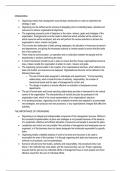ORGANISING
• Organising means that management must develop mechanisms in order to implement the
strategy or plan.
• Organising can be defined as the process of delegating and co-ordinating tasks, activities and
resources to achieve organisational objectives.
• The organising process's point of departure is the vision, mission, goals and strategies of the
organisation. Arrangements must be made to determine which activities will be carried out,
which resources will be employed, and who will perform the various activities to achieve the
organisation's vision, mission and goals.
• This involves the distribution of tasks among employees, the allocation of resources to persons
and departments, and giving the necessary authority to certain people to ensure that the tasks
are in fact carried out.
• There must be communication, co-operation and co-ordination between the people and the
departments or sections performing the tasks.
• A control mechanism should be put in place to ensure that the chosen organisational structure
does, indeed, enable the organisation to attain its vision, mission and goals.
• The organising process leads to the creation of an organisational structure, which defines how
tasks are divided, and resources are deployed. Organisational structure can be defined in the
following three ways:
o The set of formal tasks assigned to individuals and departments; * Formal reporting
relationships, which include the lines of authority, responsibility, the number of
hierarchical levels and the span of management's control; and
o The design of systems to ensure effective co-ordination of employees across
departments.
• The set of formal tasks and formal reporting relationships provides a framework for the vertical
control of the organisation. The characteristics of vertical structure are portrayed in the
organisation chart, which is the visual representation of an organisation's structure.
• In an existing business, organising must be constantly reviewed and adapted to accommodate
new strategies, new products and new processes, or any organisational changes that affect the
activities.
THE IMPORTANCE OF ORGANISING
• Organising is an integral and indispensable component of the management process. Without it,
the successful implementation of plans and strategies is not possible because of the absence
of a systematic, effective and efficient allocation of resources and people to execute the plans.
• Leadership and control are not possible if the activities of management and employees are not
organised, or if the business does not clearly designate the individuals responsible for specific
tasks.
• Organising entails a detailed analysis of work to be done and resources to be used to
accomplish the aims of the business. It is through organising that tasks and resources, and
methods or procedures, can be systematised.
• Everyone should know their duties, authority and responsibility, the procedures they must
follow or the methods they must adopt, and the resources they can use. Proper organising
ensures that the joint and co-ordinated efforts of management have a much greater and more
effective result than the sum of individual efforts.
, o Organising divides the total workload into activities that can comfortably be performed
by an individual or a group.
• Tasks are allocated according to the abilities or qualifications of individuals, thus ensuring that
nobody in the business has either too much or too little to do. The ultimate result is higher
productivity.
o Organising promotes the productive deployment and utilisation of resources.
o Related activities and tasks of individuals are grouped together rationally in specialised
departments, such as marketing, personnel or finance departments, in which experts in
their fields carry out their given duties.
o The development of an organisational structure results in a mechanism that co-
ordinates the activities of the whole business into complete, uniform, harmonious units.
• Successful organising, then, makes it possible for a business to achieve its goals. It co-
ordinates the activities of managers and their employees to avoid the unnecessary duplication
of tasks, and it obviates possible conflicts. It also reduces the chances of doubt and
misunderstandings, enabling the business to reach its goals efficiently. There are five building
blocks or fundamentals of organising that managers can use in constructing an organisation:
o Designing jobs
o Grouping jobs (departmentalisation)
o Establishing reporting relationships
o Establishing authority relationships
o Co-ordinating activities.
DESIGNING JOBS
• The first building block of organizational structure is job design. Job design is the determination
of an employee's work-related responsibilities.
• Specialisation is the way in which a task is broken up into smaller units to take advantage of
specialised knowledge or skills to improve productivity. Job specialisation is normally an
extension of organisational growth.
• Job rotation, job enlargement, job enrichment and work teams are amongst these alternative
approaches.
• Job rotation involves systematically moving employees from one job to another.
• Jobs that are amenable to rotation tend to be relatively standard and routine. Job rotation is
most often used today as a training device to improve worker skills and flexibility.
• Job enlargement was developed to increase the total number of tasks that a worker performs.
• As a result, all workers perform a variety of tasks. It was assumed that this would reduce the
level of job dissatisfaction.
• Job enrichment is a more comprehensive approach than job rotation and job enlargement. It
involves increasing both the number of tasks the worker does and the control the worker has
over the job.
• To implement job enrichment, managers remove some controls from the job, delegate more
authority to employees and structure the work in complete units. Job enrichment may also
involve continually assigning new and challenging tasks, thereby increasing employees'
opportunities for growth and advancement.
• Another alternative to job specialisation is work teams. Work teams allow an entire group to
design the work system it will use to perform an interrelated set of tasks.




